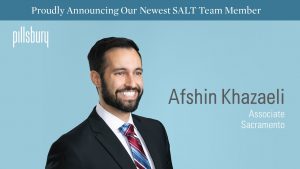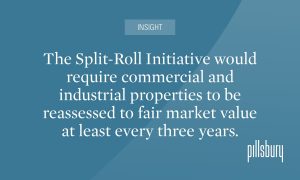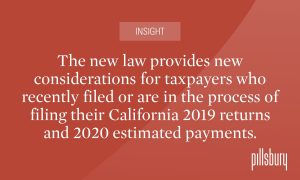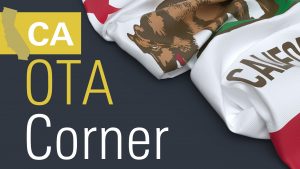
CPA and former Big 4 associate, Afshin Khazaeli joins Pillsbury SALT!
Afshin advises clients on a variety of state and local tax matters, including controversy, planning, and audit defense, across all state and local tax types, including sales and use, income, franchise, and property tax. Pillsbury SALT is thrilled to welcome him to our award-winning team. Afshin is based in Pillsbury’s Sacramento office.
5 Questions with Afshin
- Who inspires you?
I’m inspired by my father and his relentlessness.
- What drew you to the law?
I love being a trusted advocate for my clients.
- What aspect of State and Local Tax law do you find most interesting?
State and local tax is constantly changing, evolving and adapting.
- What has been your most challenging or rewarding case?
Each case has been uniquely challenging, and the most rewarding cases are when I help my clients achieve unexpectedly great results.
- What is your go-to comfort food?
Persian food! Reminds me of my mother’s cooking and being back at home.
Welcome to Pillsbury SALT, Afshin!
 and industrial properties will lose their Proposition 13 protection against property tax reassessment. Authors Craig Becker, Richard Nielsen, and Breann Robowski explain.
and industrial properties will lose their Proposition 13 protection against property tax reassessment. Authors Craig Becker, Richard Nielsen, and Breann Robowski explain.  SeeSALT Blog
SeeSALT Blog


 SeeSALT partners Jeff Vesely, Craig Becker, Carley Roberts and Breann Robowski break down Governor Newsom’s proposed tax legislation, recently passed by the California Legislature, to raise additional income tax revenue to assist in balancing the California budget. (
SeeSALT partners Jeff Vesely, Craig Becker, Carley Roberts and Breann Robowski break down Governor Newsom’s proposed tax legislation, recently passed by the California Legislature, to raise additional income tax revenue to assist in balancing the California budget. ( a two-thirds supermajority vote like local special taxes introduced by mayors or local boards of supervisors. The same deciding judge already issued a pair of rulings in favor of San Francisco last July on similar supermajority vote validity-challenging actions concerning San Francisco’s Homelessness Gross Receipts Tax and Early Care and Education Commercial Rents Tax. Both previous rulings are currently under separate appeals in the First District Court of Appeal.
a two-thirds supermajority vote like local special taxes introduced by mayors or local boards of supervisors. The same deciding judge already issued a pair of rulings in favor of San Francisco last July on similar supermajority vote validity-challenging actions concerning San Francisco’s Homelessness Gross Receipts Tax and Early Care and Education Commercial Rents Tax. Both previous rulings are currently under separate appeals in the First District Court of Appeal.
 In addition to the COVID-19 pandemic relief federal and state authorities have provided to taxpayers in the form of delayed tax return filing and payment deadlines (
In addition to the COVID-19 pandemic relief federal and state authorities have provided to taxpayers in the form of delayed tax return filing and payment deadlines (